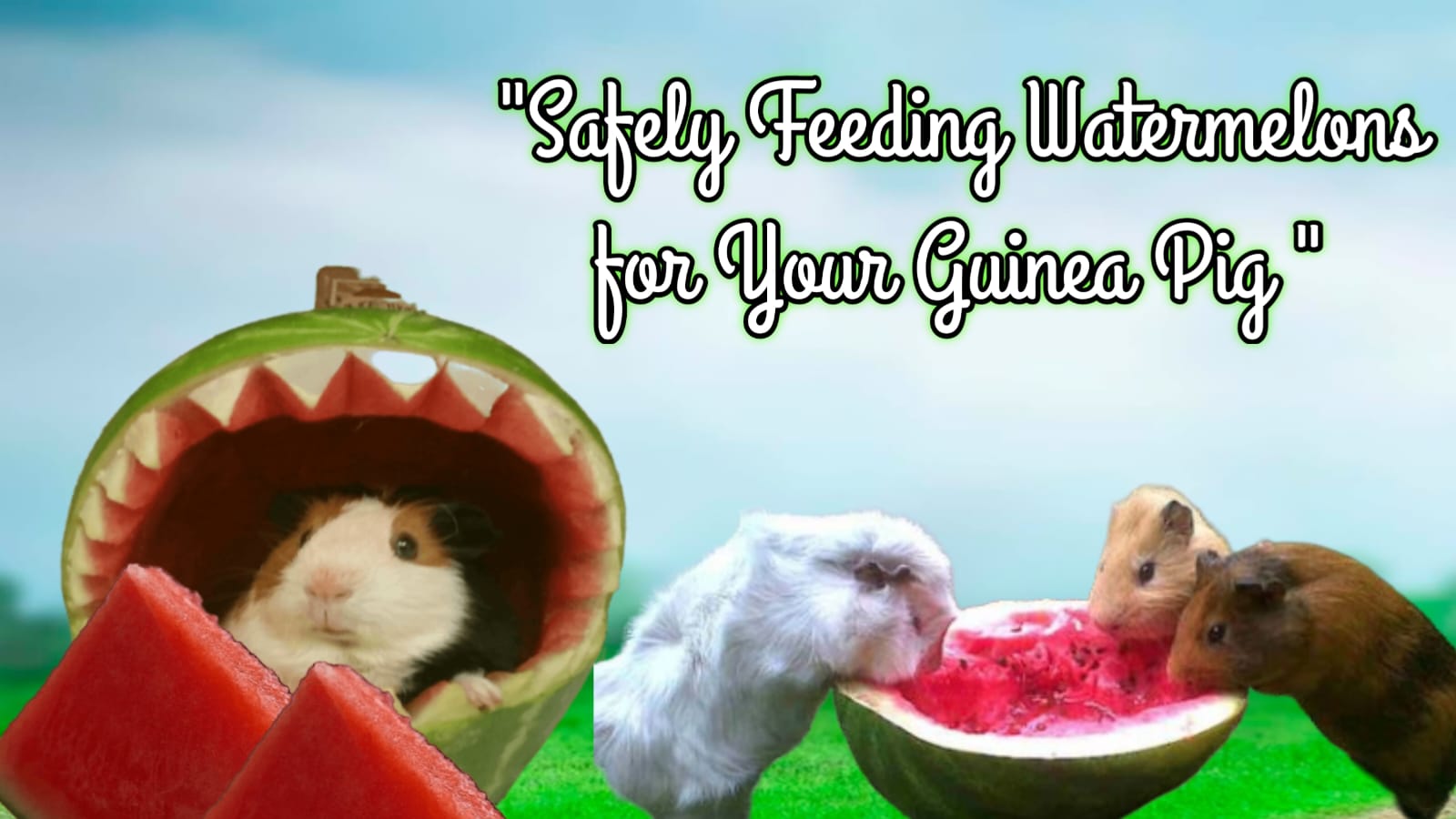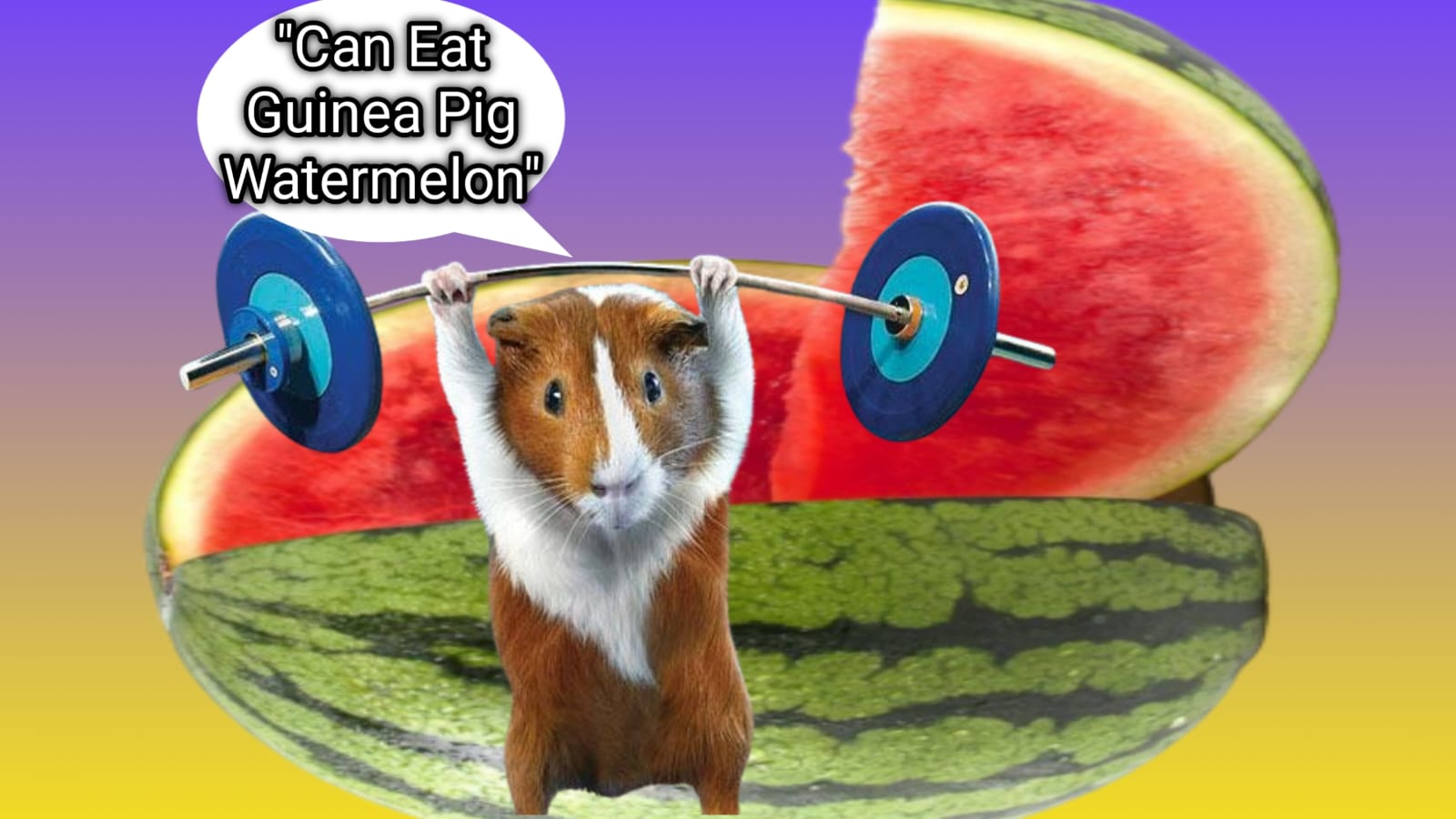Little, cute, fluffy guinea pigs that make our lives happier. It is only logical to want what is best for your pet and this includes giving it a healthy balanced diet as you are a responsible pet owner. During summer, one may wonder if guinea pigs can eat watermelons. This fruit is sweet, juicy, favored by many but should you give it to your guinea pig? Let’s explore more about watermelons and guinea pigs.
So, Today’s question is: – Can Guinea Pigs Eat Watermelon?
As pets, including guinea pigs; they rely on their owners to ensure their diet remains healthy in all aspects. Appreciating what foods are safe and healthy for them is important for good health and well-being. Pet owners often have questions about the taste and nutritional value of watermelon.
The article will help to understand whether the fruit is nutritional enough or not including the health risks associated with its consumption in relation to these animals together with feeding tips. Other than that, we will also discuss some other options except watermelons such as how do you know when your furry friend has eaten too much? So let’s begin!
Nutritional Value of Watermelon
Watermelon is not only a tasty treat, it’s also nutritious. This bright red fruit consists of 90% water making it good for quenching one’s thirst. It has numerous vitamins and minerals such as Vitamins A and C, and potassium that are essential to the human body. It is low in calorie and contains antioxidants like lycopene, which has various health benefits.
However, what this means for guinea pigs’ diets must be well understood when considering feeding them watermelons. Unlike most animals or humans who can synthesize Vitamin C in their bodies, guinea pigs cannot do so because they lack an enzyme called gluconolactone oxidase (GLO) that the others do.
In addition, there are tiny amounts of Vitamin C found in watermelon which helps prevent scurvy among guinea pigs which is very common among these pets. Besides the high levels of water contained in watermelon can help keep your pet hydrated especially during those sweltering sun rays.
On the other hand, for instance, the advantages of consuming this fruit by Guinea pigs surpass those recognized by human beings. However, despite its vitamin or hydration content; too much consumption calls for caution on sugar content.
They have sensitive digestive systems because foods with high sugar cause imbalances as well as health issues to guinea pigs. Therefore, while watermelon does offer some nutritional benefits, it should be given in moderation and as part of a balanced diet.
Is Watermelon safe for Guinea Pigs?
Though there are some important caveats, the short answer is yes. When given in small amounts under control, watermelon can be a refreshing and safe delicacy for your guinea pig. The secret here is moderation as well as proper preparation.
In fact, due to its high water content, watermelon can provide hydration especially when days are hotter and guinea pigs need to keep hydrated like any other animal. On top of this, vitamin C presence in watermelons aids in meeting the daily requirements of these pets.
Nevertheless, since watermelon contains high sugar levels it cannot be a regular item in your guinea pig’s food regimen. Too much intake of sugar by these animals leads to digestive disorders that result into obesity among others. This then means that you should give your pet little amount of melon and combine it with more hay, fresh vegetables besides sparingly giving him or her fruits.

Potential Risks Associated with Feeding Guinea Pigs Watermelon
Watermelon is a refreshing fruit, but it can be dangerous to feed it to a guinea pig. The main concern is its high sugar concentration. Guinea pigs cannot process large amounts of sugar well due to their digestive tract. Guinea pigs may suffer from diarrhea if they eat too much watermelon hence endangering them because they are tiny.
Moreover, you risk having your pet eat watermelon with seeds or skin that might pose danger to the guinea pig. Always remove watermelon seeds before giving the fruit to your pet because they can choke on them. Although not poisonous, guinea pigs struggle with rinds as they are hard and chewy for them to consume. Therefore, do away with seeds and rind and just stick with juicy flesh when serving your cavy.
Everything in moderation! Providing excessive quantities of watermelons might cause digestion problems in guinea pigs thus causing discomfort and other health concerns in these animals. It is therefore advisable to give them occasionally rather than making it a regular part of their diet. If your new food has caused any kind of worry resulting into sickness/vomiting while feeding call the vet.
Safely Feeding Watermelons to Guinea Pigs?
Should you choose to give your guinea pig some watermelon, there are particular steps you need to take in order to do it safely. Initially, select a ripe melon that has no mold or decay. Wash the outer part carefully so as to eliminate any pesticides and other impurities.
Afterwards, slice the watermelon into tiny pieces that can be easily chewed by the pet. Take out all seeds which may cause choking and don’t feed your guinea pig with rind. They love juicy part of watermelon best.
Just like a small block or two should be the serving size for them not exceeding their paw’s size. This way they get flavor, get hydrated too with less sugar in their system. Introduce watermelon slowly and watch for signs of tummy upsets in your guinea-pig; if they seem happy about it and exhibit no ill effects whatsoever you can try giving it as a treat once or twice weekly.
Watermelons Can Be Substituted with:
Notwithstanding its fun nature, watermelon is not the only fruit to go for with regards to pet guinea pigs’ health and safety. Some options include bell peppers (rich in Vitamin C) and cucumbers that are also low on sugar levels.
Strawberries, blueberries, apples (no seeds) are other healthy fruits. Due to their high sugar content, they should be given sparingly. Vegetables such as carrots, leafy greens and zucchini are better ways of incorporating nutrients variety into your pets` diets without having too much sugar like what fruits have.
This keeps a well-rounded diet instead of your guinea pig developing craving for one type of food. Always start out slowly when introducing new foods and be on the lookout for any digestive problems or signs of allergies.
Symptoms of Overfeeding or Negative Reactions
Vigilance over how much and what kind of food your guinea pig eats is very important. Diarrhea, bloating and lethargy are signs that you have overfed your pet with watermelon or any other sugary treat. If these symptoms occur, stop feeding the wrong food immediately and call a veterinarian.
Other signs may include reduced appetite, behavioral changes or visible distress. Always make sure to provide plenty of hay and fresh water for your guinea pig since they are vital to their digestive system.
AFQ:
1.Can guinea pigs eat watermelon?
Yes, guinea pigs can eat some amount of watermelons. The juicy flesh of the melon is harmless and serves as a good way for your guinea pigs to hydrate themselves. However, it should not be included in their regular diet because it contains a lot of sugar.
2.How often can I feed my guinea pig watermelon?
Watermelon should be served sparingly- at most once or twice every week. This will ensure that your pet takes advantage of the fruit’s benefits without risking excess levels of sugar intake in its body system.
3.How much watermelon can a guinea pig take?
Keep in mind that this is equivalent to a small cube or two, similar to the size of your pet’s paw. So, it becomes more comfortable for them when eating and does not fill their digestive system with too much sugar.
4.Are watermelon seeds safe for guinea pigs?
Watermelon seeds are not recommended for guinea pigs as they are a choking hazard and may lead to digestive problems. Remove all the seeds before giving your guinea pig any piece of watermelon.
5.Is it okay if my guinea pigs eat the rind of a watermelon?
Although the rind itself is non-toxic, it is tough and hard for cavies to chew or digest hence avoid offering them with rinds but instead only give them juicy flesh of watermelons.
6.What are some reasons why I should consider giving my guinea pig watermelons?
Water melon will keep your cavy hydrated since has high moisture content. Guinea pigs cannot make Vitamin C themselves so it contains some which they need due to its absence in their bodies.
7.Watermelon has what risks as food for guinea pigs?
The major risk is the high sugar content of watermelons. Overeating can lead to digestion problems, obesity, and other health issues. Moreover, the seeds and rind of melons may cause choking problems while being also hard to digest.
8.How can I prepare watermelon for my guinea pig?
To prepare watermelon as food for your guinea pig go through these guidelines:
- Choose a ripe fruit that is not overripe and wash it properly.
- Cut the watermelon into small bite-sized cubes
- Take all seeds out of the cubes
- Avoid giving your guinea pig the rind; only offer the juicy flesh.
9.Can baby guinea pigs have water melon in their diet?
It’s better not to feed baby guinea pigs with watermelons since they have more delicate digestive systems, requiring higher fiber-content diets plus other growth essential nutrients. Instead, give them young hay or pellets made specifically for them and appropriate vegetables.
Conclusion
In summary, although it can be a refreshing and delicious treat for your guinea pig, it should not be given in excess because of some health concerns. To enjoy the benefits of this succulent fruit while being aware of its nutritional value and appropriate portion sizes is important.
Watermelon is water-rich and contains Vitamin C, making it a valuable food especially during hot weather. However, its high sugar content means that it should not be part of your guinea pig’s daily menu. Always make sure to remove seeds and rind, cut into small bits you can manage comfortably then observe how your guinea pig responds.
In addition, a variety of fruits and vegetables should be considered to ensure a balanced diet. Bell peppers, cucumbers, strawberries and leafy greens are some excellent alternatives to feed them without excessive sugar.


